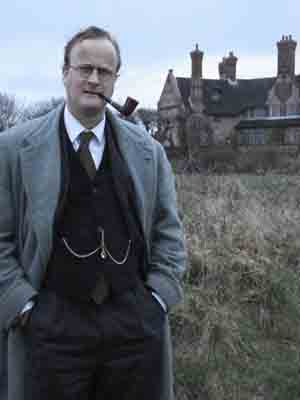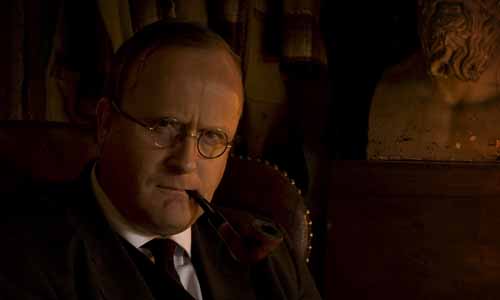Guest writer ROBERT LLOYD PARRY spends much of time his time performing the works of Montague Rhodes James (1862-1936), known as England’s great author of the supernatural. Here he tells us why M.R. James’ ghost stories are the spookiest.
There’s a word that covers pretty much all that I admire about the supernatural tales of Montague Rhodes James.
It’s a word he used himself to great effect in those stories, and it’s also a rather good description of the kind man he was.
The word is ‘curious.’
Curious in the old fashioned sense, in that he was odd, an object of curiosity in his own right.
Outwardly he was pretty conventional.
He spent much of his adulthood at Cambridge University and photographs suggest a stereotypical don.

But behind those round glasses, beneath the oily hair, there lurked an extraordinary – sometimes dark, more often, I think, playful – imagination.
And this found its expression in the greatest ghost stories to have been written in the English language.
The stories themselves tell of curious events, of course: pictures come to life, curses are fulfilled, sceptics are baffled, inanimate objects wreak vengeance.
They defy straightforward summary – perhaps because James’s delightful prose style and his brilliant sense of timing are so much part of their power – and I can do no better than implore you to pick up a copy of his ‘Collected Ghost Stories’ at the earliest opportunity.
Almost any one will do for starters. Why not try ‘Rats’?
In its few pages it contains all the humour, nostalgia, horror and sense of place that make James such a joy to read today.
But James was curious in the other sense of the word: he was always seeking knowledge, he was fascinated by the less well travelled byways of history, folklore, art and literature.

In short, he paid attention, where others did not.
This aspect of his personality emerged in infancy and remained a constant.
He was not a man particularly prone to self-analysis and his memoirs don’t give much away, but at one point in them he reflects upon his schoolboy reading: “At this time… all antique knowledge seemed immensely desirable… nothing could be more inspiriting than to discover that St Livinus had his tongue cut out and was beheaded, or that David’s mother was called Nitzeneth.”
As the quotation suggests, what he paid closest attention was church history and the Apocryphal books of the Bible, and if there was an added frisson of violence and horror, then, well, so much the better.
This recondite lore, accumulated during a lifetime, made its way into his stories and James’s vast arcane knowledge, filtered through that extraordinary imagination, is perhaps what sets him apart from his fellow writers of ghost stories.
When James writes about a picture of a demon in a book, say, or describes the hanging of a witch, its clear that he knows what he’s talking about.
You trust him, and that makes the stories that bit more terrifying.
ROBERT LLOYD PARRY is an actor and writer. He regularly performs the ghost stories of M R James at venues around the UK and Irleand and has released DVDs and CDs of some of the best of James’s tales. For more details see his website at www.nunkie.co.uk.
Liverpool’s PAUL JASON, was inspired by the above article when it was originally published in May 2012, describes how England’s greatest ghost writer can terrorise with the stroke of a pen.
Key to M.R. James’ terror is your mind
The art of a good ghost story is to focus on the imagination of the reader.
Montague Rhodes James does this with great skill as the horrors always seem to be just out of view or in the corner of the eye.
Often physical apparitions do not show their faces, as M.R. James harnesses your “minds eye” to make you see or hear what will scare you most.
Over the years, I have read his stories from the ‘Ghost Stories of Antiquary’ collection and thoroughly recommend this book.
I admittedly first came across M.R. James’ work in the television adaptations of several of his tales; plays made for a series called ‘A Christmas Ghost Story’ and where beautifully directed by LG Clarke. Clarke brought the stories to life perfectly, with much love and care.
Like many other James fans, my favourite story is ‘Oh Whistle and I’ll Come to You’. This is the most famous of the TV adaptations, firstly in 1968, directed by Sir Jonathan Miller, and more recently, in 2009, written by Neil Cross. Having read this tale several times, I was keen to watch the modern adaptation.
The first, 1968 version, starred Michael Horden as the usual James ‘nosey’ archaeological type. After discovering an ancient whistle buried in some sand dunes, he finds himself being followed and tormented by a spirit guardian. It follows him along a lonely Suffolk beach, eventually rendering him senseless in his lodgings. Miller directed this scene superbly, using slowed down sound to represent the abhorrent fear Horden displays when confronted with what looks to be simply a moving bed sheet.
The second adaptation, written by Neil Cross, again was full of dark silences and featured he bleak lonely Suffolk coastline. This time a retired astronomer stays in the hotel he and his elderly wife, who is now in a nursing home suffering from dementia, used to regularly visit. He is haunted and tormented by a spectre after finding an antique ring. On his last night he is terrified as the ghostly apparition of his wife crawls eerily under his bedroom door! He is found, the next morning, lying dead in his bed.
These are truly strange and terrifying stories and have stayed with me for many years.
If you have the imagination and fancy a real scare, open your minds eye to these tales.
PAUL JASON is a a 42 year old Tree Surgeon from Liverpool: “I have been fascinated with everything ghoulish since I was a child. This is my first written review of any type so hope you enjoy. You can comment or contact me on twitter @arborist2222







